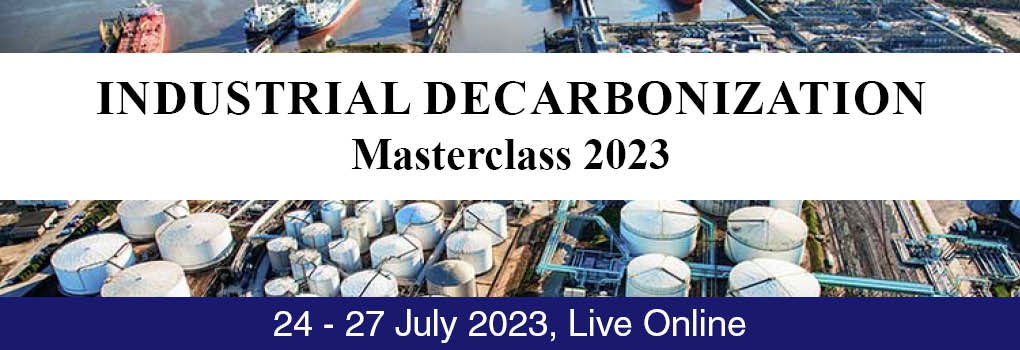Program Overview:
The industrial sector is progressively becoming the primary source of CO2 emissions, and its decarbonization is critical to limiting the global temperature increase and achieving net-zero carbon emissions targets.
Cutting industry’s carbon emissions will require significant investment and coordinated effort among businesses, governments, and other stakeholders. Lowering industrial GHG emissions won’t be easy, particularly for industries that operate industrial & technical activities that release most of the industry’s GHG emissions Steel, Cement, Mining, Oil & Gas, Energy & Utilities, Aviation, Maritime and Automotive. Not only will it take massive plans and efforts to reinvent production, manufacturing, operations, and technical processes, the decarbonization of these sectors will cost between $11 trillion and $21 trillion through 2050 and will require accelerating the build-out of renewable-energy capacity, to provide four to nine times as much clean power as industry would need in the absence of any effort to reduce emissions. It is therefore crucial to provide industry with alternatives to achieve full decarbonization that is cost effective and avoids shutting down of operations or relocation to other more favourable (less restrictive) countries.
Amidst the challenges, how can organizations bring their CO2 emissions close to zero with a combination of approaches? How can they leverage on energy efficiency improvements, use of alternative fuels, tapping on carbon capture & storage technologies/facilities, make necessary investments or streamline & change their production processes to achieve their net zero carbon targets? How can they plan their strategy in an economically viable manner without disrupting operations to achieve industrial decarbonization goals?
All these and more will be covered at Equip Global’s Interactive & Pratical Industrial Decarbonization Masterclass taking place 24 - 27 July 2023, Zoom Online where we will cover all of the above and more to provide you with information that can really help you in your day-to-day work. During this course we will dive deeper into options that are available for the industry to decarbonize and remain competitive. Those include the use of carbon capture utilization and storage (CCUS) as well as the utilization of alternative fuels like hydrogen, biomethane and ammonia. Furthermore, the path taken will be shaped by the (global and regional) policies that are coming up or are already in effect. We will thus also touch upon these which include the EU border adjustment mechanism and the US inflation reduction act. As well as trends going towards the future from various organizations like the IEA. We will evaluate the current industrial energy landscape and technological options that exist to decarbonize these, dive deep in the potential applications, existing and new policies that will drive this push, as well as the trends & economics for future growth.
Through case studies, practical insights and actual project experiences, this Industrial Decarbonization Masterclass is committed in providing you with only practical and implementable solutions that can overcome your biggest challenges in achieving your industrial decarbonization goals

10 Key Benefits of Attending:
- Gain a clear understanding of the various pathways and options, principles & concepts in achieving industrial decarbonization goals.
- Learn about how you can reduce demand for carbon-intensive product through circular economy including industrial symbiosis.
- Gain knowledge on how you can deploy decarbonization technologies & processes including electrifying processes with renewable electricity, using renewable sources (solar, geothermal, bio-base heat) and deploying green hydrogen and carbon capture use & storage (CCUS) including first hand experience of the first large scale CCUS plant Boundary Dam three in Canada
- Find out more about the economics of industrial decarbonization including feasibility analysis and long-term project viability.
- Analyse the various business models and cases globally and how you can apply them into your industrial decarbonization plans and projects.
- Learn more about how you can improve energy efficiency in all industrial sectors including the implementation of innovative measures and technologies
- Hear about how you can adopt a holistic & cost-effective approach in your industrial decarbonization roadmap whilst managing all stakeholders.
- Gain insights into the most common mistakes made in the decarbonization process and how you can avoid them.
- Evaluate policy and regulatory perspectives including global initiatives and national nuances around industrial decarbonization.
- Apply lessons learned on Biomethane operations whilst navigating barriers and inhibitors affecting biomethane take up rate.

Who Should Attend:
Industry Participants who are looking to improve their knowledge and company’s plans on Industrial Decarbonization from across industries including oil & gas, energy & utilities, aviation, maritime, mining, cement, steel, automotive, industrial manufacturing, and forestry.
This masterclass is also a must-attend for the following:
- Leaders and managers who are interested in exploring the issues around the concept of energy transition and decarbonization and find the ways to contribute to GHG reductions.
- Government officials who are tasked with the development or execution of net-zero/decarbonization policies and initiatives.
- Financial services professionals and asset owners who are interested in decarbonization of their portfolios of assets.
- Technical professionals who want to get broader understanding of climate change and their role in transitioning to net-zero.
- Innovators, Engineers, and Inventors looking for inspiration to come up with solutions to complex climate change problems.
- Anyone who wish to engage with the challenges and potential solutions to sustainability and climate change.
Like More Information?
Email us today at enquiry@equip-global.com for more information.

